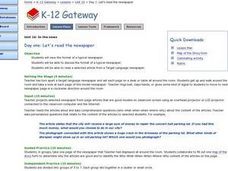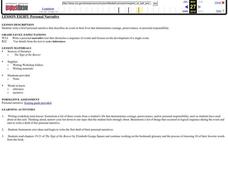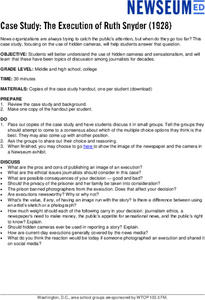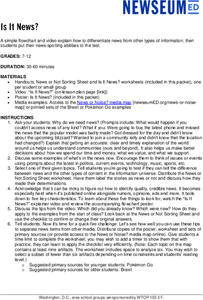Reporters Without Borders
2017 World Press Freedom Index
Freedom of the press was seen as a right so important that the Founding Fathers listed it as part of the first amendment to the United States Constitution. Americans pride themselves on this freedom, but just how free are American...
Curated OER
Radio News
Part of a larger unit from the Media Awareness Network on media literacy, this particular lesson plan focuses on the medium of news radio. Small groups participate in discussions on their radio listening habits as well as the...
Curated OER
Reporter rights vs. legal access...
Students write an article to inform readers about confidentiality with reporters, attempting to find local lawyers and journalists to explain the issues as they relate to them. Students research past cases and the status of the current...
Curated OER
Towing Cars -- Legally and Not So Legally
Students discuss the issue of having cars towed in a small community when they should not be. After watching a local news story on the issue, they work together to conduct three full days of research. They write an article to be...
Curated OER
Persuasive Elements
Investigate letters to the editor and their persuasive qualities. Break your class into reading groups and give each one a different article. As they read, they complete a graphic organizer to record their thoughts and opinions. There is...
Curated OER
Writing a Class/School Newspaper
Students use their interviewing skills to gather information for a school newspaper. They summarize their interview and create an article for the school newspaper. Students develop the article, edit it using the spell check and revise...
Curated OER
Photo Editing and Photo Ethics
learners investigate how to editphotos and understand the ethics of photo-editing in regard to photo-journalism. In this photo journalism lesson, students examine photos and photo spreads in various sources to identify editing...
Curated OER
Let's Read the Newspaper
Students investigate the format of a typical newspaper. In this journalism lesson plan, students read a newspaper from a target language and discover the vocabulary associated with the news. Students work together as a...
Curated OER
What's the News?
Students investigate current events. In this current events lesson, students identify current events from newspaper articles and place them on a timeline.
Curated OER
Creating Hate: The Power of Words
Students explore why authors choose to use hate words in literature. In this power of words lesson, students complete group participation, journal entries, and written assignments to investigate the use of inflammatory...
Curated OER
Personal Narrative
Students explore personal stories by investigating narrative writing. In this nonfiction writing lesson, students participate in a workshop in which they write three events from their own life. Students write first drafts of these...
Curated OER
Ancient Greece: Inquiring Minds Want to Know
Second graders explore world history by writing newspaper articles. For this Greek history lesson, 2nd graders investigate the geography and society of Ancient Greece by utilizing the Internet as a research tool. Students collaborate...
Newseum
Case Study: The Execution of Ruth Snyder (1928)
The case of the 1928 execution of Ruth Snyder takes center stage in a lesson that asks young journalists to consider the ethics involved in publishing an image of an execution. A series of discussion questions ask individuals how they...
PBS
Decoding Media Bias
Alternative facts? After watching the We The Voters film, "MediOcracy," viewers compare how cable news outlets CNN, Fox News, and MSNBC report the same story about politics or public policy. After a whole-class discussion of their...
News Literacy Project
News Goggles: Tracking Developing Stories
A 28-slide presentation introduces viewers to the process reports go through to track and verify developing news stories. Using the reports of the attacks at Atlanta, Georgia, massage parlors as an example, viewers are taught what to...
News Literacy Project
News Goggles: Covering a Newsworthy Trial
The trial of Derek Chauvin, former Minneapolis police officer charged in the death of George Floyd, is the focus of a lesson that asks pupils to compare how local, nationial, and international news organizations reported the testimony of...
News Literacy Project
Fact-Check It!
Here's a lesson designed to help learners develop their digital verification skills. First, expert groups study specific digital verification skills, and in a jigsaw activity, share what they have learned with classmates. The jigsaw...
iCivics
Lesson 3: Bias
How do journalists balance bias and ethical reporting? The final lesson in a series of five from iCivics examines the different types of bias and how they affect the news we read. Young reporters take to the Internet to find examples of...
Newseum
Reporting Part III: Staying Objective
The third and final lesson in the Reporting series tests young journalists' ability to be objective in reporting contentious topics. After brainstorming a list of contentious topics that interest them, the class selects one, and...
Newseum
Is It News?
Is it news or not? That is the question young journalists must consider in a lesson about newsworthiness. Class members watch a short video that details five key characteristics of quality, credible news. Individuals then use these tips...
Facebook
Versions of Media Texts
Verification of provenance and the original source of an image or video can be a long and winding process. Young journalists learn about the difficulty of finding the original source of a scrape, a copy of an original news story, and...
Facebook
Metadata
In previous lessons, young journalists learned about how to trace the original source of scrapes and memes. This interactive lesson plan teaches them another important step in the verification process. Participants learn how to analyze...
Newseum
You Can’t Say That: Right to Know vs. Security Risk
Print or block? That is the question young journalists debate as part of their study of the freedom of the press. Half the class represents the journalists' legal team, and the other half represents the government's legal team. Teams...
Curated OER
That Is Not My Opinion!
Being an informed citizen requires distinguishing fact from opinion and understanding persuasion methods. Secondary learners evaluate newspaper editorials. They read opinion pieces, identify the writer's purpose and position on an issue,...

























